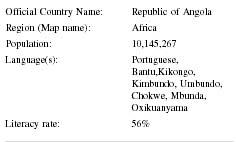Angola
Basic Data

| Official Country Name: | Republic of Angola |
| Region (Map name): | Africa |
| Population: | 10,145,267 |
| Language(s): | Portuguese, Bantu, Kikongo, Kimbundo, Umbundo, Chokwe, Mbunda, Oxikuanyama |
| Literacy rate: | 56% |
Angola was the location of the world's perhaps most prolonged and severe civil war in the last quarter of the twentieth century. Upon independence from Portugal in November 1975, the country was plunged into civil war with the ruling Popular Movement for the Liberation of Angola (MPLA) fighting a rebel movement, the National Union for the Total Independence of Angola (UNITA), for control of the country. Democratic elections were held in 1991, but UNITA disputed the result. Despite a peace accord in 1994, civil war raged until the death of UNITA leader Jonas Savimbi in February 2002, when prospects for peace seemed the best since Angolan independence. In the first 16 years of the civil war it was estimated that 300,000 people had been killed out of a total population of 12 million.
Angola possesses significant petroleum resources, in some years supplying 5 percent of the U.S. international supply, and is the location of significant diamond deposits, although the national economy remains one of the worst performers in the world and the living standards of the Angolan people is one of the lowest. Throughout the civil war both sides distrusted the media and neither side was prepared for media coverage of their activities, a situation that made journalism in Angola one of the most hazardous occupations in the world. The ascendancy of the MPLA as the governing party has not made the situation for journalists any more secure; the government feels even freer to stifle independent opinion and restrain any free press.
The press, television and radio were nationalized in 1976 and thus the government dominates the media. The government controls the only news agency (ANGOP), the only daily paper ( Jornal de Angola, with a circulation estimated at 40,000 but a readership of probably more than 100,000), the national television network (Televisao Popular de Angola) and the national radio station (Radio National de Angola). The national radio broadcasts in Portuguese, English, French and Spanish as well as nine local indigenous African languages. There is an independent press, namely Folha 8, a Luanda-based weekly, and Actual and Agora two other independent weeklies. WT Mundovideo is a local television broadcaster in Luanda, and Radio Morena and Radio Lac Luanda are independent radio stations in Benguela and Luanda, respectively. Luanda-Antena is an independent commercial radio station. Radio Ecclesia is a Roman Catholic FM station generally agreed to be the most vociferous critic of the government and it has been the target of much state-sponsored criticism and pressure to modify coverage. It has suspended daily broadcasts on occasion as a protest against government pressure and hate campaigns. Both government and private sector advertising is discouraged in independent newspapers, and hence, financial viability of the independent media is always in question.
The constitution of the Republic of Angola specifically codifies freedom of expression and of the press, but often this is not respected. During the civil war a number of journalists were killed or imprisoned and this has continued into the twenty-first century. Journalists from the government news agency and from Folha 8, and Agora, as well as BBC, Voice of America and Portuguese television correspondents have been singled out for attack, threats and harassment. One figure stands out in this regard, Rafael Marques, a local freelance journalist and human rights activist, who repeatedly has been detained and interrogated for articles he has written and jailed for defamation of the president. As a result, the combination of government censorship and fear of government reprisals has meant most journalists practice self-censorship. A new draft media law was introduced in 2000 but was withdrawn later that year after much criticism.
There is a Committee to Protect Journalists (CPJ), an Angolan media Women's Association and a Union of Angola Journalists (UAJ), the latter formed primarily of government-employed journalists and with little credibility outside Angola. However, UAJ is leading the way in providing education and training for journalists and in providing the first school of journalism in the country's advanced education system. Foreign news agencies cover Angola from Johannesburg (Reuters and AP), while the BBC and Portuguese media have a greater presence in Angola owing to their former colonial role in the region. While their entry into the country is not restricted, some restrictions have been placed on their movement inside the country—ostensibly for their safety—and on rebroadcast of transmissions.
Angola faces an uncertain future. In practice the civil war ended with the death of Jonas Savimbi, but media freedom has not followed. A 25-year legacy of distrust and disrespect is not easily removed. At the same time, Angola remains one of the world's poorest nations with poorly developed infrastructure, including Internet communications, and a desperately poor people. The prospect of greater wealth arising from petroleum and diamonds is present, but much will have to change in the form of removal of corruption, economic mismanagement and political power arising from resource control. These are explosive issues the media must confront in order to fulfill a role in national development—and it can expect much opposition.
Bibliography
"Angola." BBC News Country Profile. Available from http://news.bbc.uk .
"Crackdown on Angola's Independent Media Condemned." Human Rights Watch, 2000. Available from http://wwwhrw.org/press/2000 .
"Media Outlets in Angola." Available from http://www.Angola.org .
"Media Situation deteriorates in Angola" Digital Freedom Network. Available from http://www.dfn.org/focus/angola/media-deterioration.htm .
U.S Department of State Country Reports on Human Rights Practices, 2001. Available from http://www.state.gov .
Richard W. Benfield